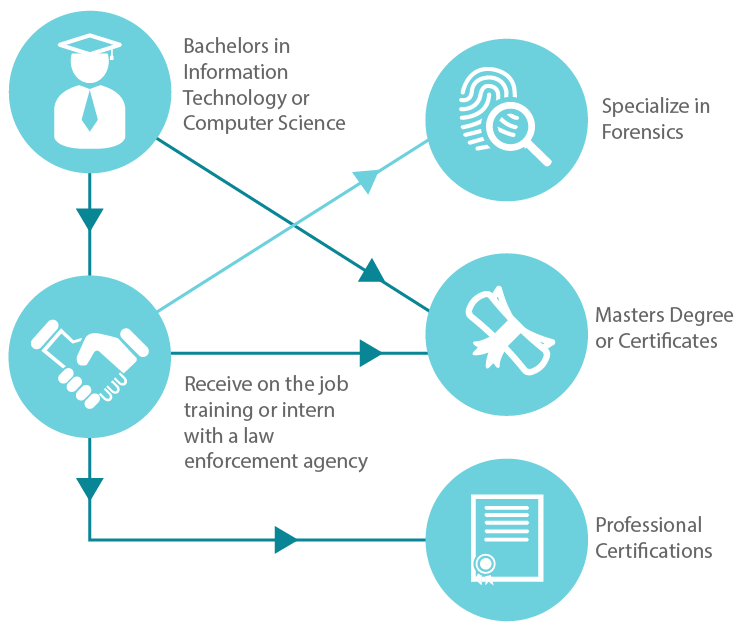LEARN HOW TO BECOME A COMPUTER FORENSICS EXPERT

A computer forensics expert specializes in acquiring and analyzing potential evidence in investigations, even when the data has been deleted, encrypted, or damaged. They possess advanced skills to uncover digital traces, conduct thorough examinations, and provide expert testimony. Computer forensic experts play a crucial role in uncovering vital information and aiding legal proceedings.
Computer forensics experts (and computer and information security careers in general) are increasingly in demand by corporate and governmental bodies due to the quantity of breaches and hacks they are experiencing. The U.S. Bureau of Labor Statistics cites a much faster than average growth for forensic and information security roles. The word forensics itself may mean different things to different people. Many may conjure images of television cyber forensics experts who pour over physical evidence—fibers, blood samples, bullet markings. However, others may recall that the field of forensics extends into to the world of computer science.
WHAT IS COMPUTER FORENSICS?
There are two general sides to the computer security field: those who defend against cyber crimes and those who investigate them. A cyber forensics specialist is in the latter camp and is called in once a security breach has been discovered. The analyst's job is to predict how criminals might attack next and then implement the very best software and security protocols for their team.
Security Analyst: Predicts how criminals might attack next and then to implement the very best software and security protocols for their team.
Forensic Expert: A forensics expert is in the latter camp and is called in once a security breach has been discovered.
When you decide that a cyber security career is the path you would like to pursue, start thinking along these lines. If you would like to be involved with digital forensics, you will likely start your career in law enforcement. That might include the FBI, CIA, or some branch of the Department of Homeland Security. You might also consider working for the Department of Defense as a contractor, or you might enter the armed forces and apply your knowledge there.
Both fields inform the other, so it is not unheard of for a forensics expert who works for the Department of Defense to enter the public sector as a cyber security analyst for a bank. However, to make any significant transition, you will probably want to consider gaining extra certifications to help prove your investment in your new field.
More and more crimes are carried out over the computer these days. Passwords and credit card numbers are part of the trade passed around by hackers. Information is possibly more valuable than mere possessions. It's no wonder, then, that so many are seeking cyber forensics training in colleges and universities nationwide.
When you receive your education in computer forensics, you will be able to assess the nature of cyber crimes and follow the evidence to find the perpetrators. You will have the sorts of credentials that are coveted by government agencies and private corporations. After all, everyone who uses computers or a networked system is susceptible to an attack.
WHAT DO CYBER FORENSIC EXPERTS DO?

A cyber forensic expert possesses specialized training and utilizes advanced tools to recover and analyze digital data in a forensic manner. Their expertise lies in investigating cybercrimes, analyzing digital evidence, and providing expert testimony. By combining technical skills and forensic methodologies, cyber forensic experts play a crucial role in uncovering digital evidence and aiding in legal proceedings.
You will need to be meticulous with how you handle evidence and even how you train the first responders to deal with any electronics such as computers, hard drives, or portable drives. If any electronics are tampered with, your investigation might lose information or break the chain of evidence, rendering any evidence tainted and inadmissible in court.
You also might work as a cyber consultant for a law firm that defends clients accused of cyber crimes. In that case, you will need to assess how evidence has been collected and handled by the prosecution. You will need to do your own independent investigation of the case and the evidence so that you can help build the best defense for the firm's client.
Whether you work for law enforcement or a defense team, you will need to be well-versed in all of the applicable laws, as well as appropriate protocols for evidence handling. Since you might be exposed to highly sensitive information, you must know privacy law and adhere to it. As a professional, you can't afford to be seen as unethical in any way.
After the evidence is analyzed, you will likely be briefed on your testimony with your team of lawyers. Then, you may be deposed by the opposing counsel. After that, you will be called to appear in court. As a professional, you will need to have a strong and consistent case to defend on the witness stand. You will also need to have strong speaking skills that can help you convince the jury of your assessment of the evidence.
HOW DO YOU BECOME A COMPUTER FORENSICS EXPERT?
Like many jobs in the high technology sector, a digital forensics job can be had by a tenacious techie who applies him or herself and is either self-taught or learns on the job. However, standard requirements for an entry-level cyber forensics job might include a bachelor's degree in computer science or even information technology. If possible, try to study issues related to security while in your undergraduate program. For instance, you might take courses in security policy, network security, and cryptography.

To truly succeed, you will need to not only have top-notch computer skills, but you must be able to perform as a law enforcement officer. You might be called to testify in court when hackers invade a banking system, or you might have to determine with 100% certainty that a terror cell has attempted to hack into the Pentagon's mainframe system. With that in mind, you will need to be able to work with speed and efficiency, as time may be of the essence.
COMPUTER FORENSICS EDUCATION
To become a computer forensics expert, you will need the proper digital forensics degree and education. That starts with an undergraduate degree from a local college, university or accredited online institution. From there, you can move on to additional education in a graduate program. You might also opt for professional certification.
Undergraduate
Most frequently, you will find that a four-year program is a more broad-based computer science degree, while there are a few that focus on cyber security or even the specific field of digital forensics. If you are in a forensics program, will find that the degree covers a lot of different areas. In fact, these degrees combine criminal justice courses with IT-focused subjects. Your major curriculum might include some of these courses:
- Criminal Law
- Malware Forensics
- Cybercrime
- Introduction to Networking
- Cryptography
- Digital Forensic Analysis
- Criminal Procedure
- Financial Accounting
- Statistics
- Economics
- Technical Writing
Note that many IT and computer science programs offer courses in cyber security, including forensics. In fact, many will offer a series of cyber security courses in security that will amount to a minor. With this coursework under your belt, you might seek your first job with a security firm or in an IT department. Alternatively, you can likely use your undergrad transcripts to apply for graduate-level cyber education.
Master's Degree
More often, students begin their focus on computer forensics in graduate school. With a solid foundation in the basics of computer programming, networks and databases, they move forward to a specialized area. Even if your undergraduate degree was in forensics, you will benefit from a graduate program in computer forensics.
The coursework in a graduate program might resemble courses you took in undergrad, but they are likely to be far more in-depth and intense. Some of the courses you might find in a graduate program include, but are not limited to:
- Information Assurance
- Programming for Security Professionals
- Data Engineering
- Digital Forensics
Professional Certification
Once you have achieved a post-secondary degree, you might consider working on professional computer forensics certifications. To achieve a certification, you will often have to take a course through the certifying agency and then pass their professional examination.
Here is a brief sampling of the certifications you might consider:
- Certified Computer Examiner (CCE): The International Society of Forensic Computer Examiners offers training, but self-study methods may qualify you to sit for their examination.
- Computer Hacking Forensic Investigator (CHFI) V8: This certification course will make you an expert at building a case and prosecuting a nefarious hacker.
- Certified Forensic Computer Examiner (CFCE): To qualify for entrance to this certification program, you must satisfactorily solve four problems. Each is sufficiently difficult to require up to 30 days for each. After successfully completing this 120 day pre-screening, you will be asked to solve a problem related to a hard drive and then pass a 100-item examination that covers forensics. With your certification fees, you will receive a membership to The International Association of Computer Investigative Specialists.
Since the field of cyber security is constantly changing, you will want to continue your education and these programs are a great way to stay current with an ever-changing field, while also adding credentials to your resume.
POSSIBLE DIGITAL FORENSICS CAREER PATHS

Once you become trained in computer science, your path to being a forensics expert is largely determined by your ability to acquire on-the-job skills and pursue additional formal training.
COMPUTER FORENSICS SALARY

ANNUAL MEDIAN SALARY OF
$64,940
Forensics Technician

ANNUAL MEDIAN SALARY OF
$120,360
Information Security Analyst
Computer and information forensics experts are in high demand, which will put you in an enviable position once you have gained the experience and credentials you need to succeed in the field.
Salaries in computer and information forensics can start around $64,940 a year, and for the highest 10% in the field, the average compensation is approximately $107,490 a year. But an Information Security Analyst can command a $120,360 median annual salary says the U.S. Bureau of Labor Statistics 2023 Occupational Employment Statistics.
CYBER FORENSICS JOB OUTLOOK
The future looks bright for cyber security professionals, including forensics experts. Government agencies such as the Department of Homeland Security and the Federal Bureau of Investigation are clamoring for top-notch team members.
You might also work as a private contractor for a wide range of clients, or perhaps you could specialize in working for legal defense, helping to protect wrongfully accused citizens. No matter what your specific career path looks like, it is bound to be fruitful and rewarding.
In fact, the U.S. Bureau of Labor Statistics states that the field continues to grow rapidly, citing an anticipated 31.5% growth through 2032 because cyberattacks have increased in frequency. Computer forensics is vital to national and corporate security and you are bound to find a rewarding career in the field. It all begins with your education and other training, so start looking for the best program for you today.
Explore Cyber Security Careers
- Becoming a Cryptographer
- Cyber Security Salaries Overview
- How to Become a Cryptanalyst
- How to Become a Cyber Security Analyst
- How to Become a Database Analyst
- How to Become a Forensics Expert
- How to Become a Network Security Analyst
- How to Become a Security Auditor
- How to Become a Security Consultant
- How to Become a Security Engineer
- How to Become a Security Software Developer
- How to Become a Security Specialist
- SOC Analyst Career Guide
